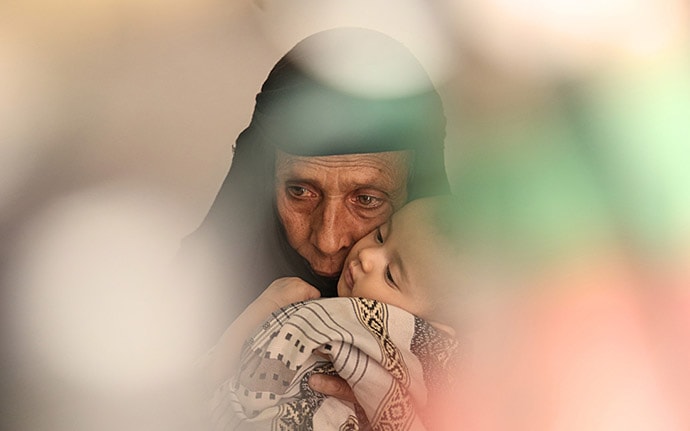Yemen Demands Our Urgent Action
Find out how Global Washington members are responding

Khulood lived with her grandmother and father in Haradh area, which was subjected to heavy aerial bombardment that destroyed many facilities in the area. Khulood’s grandmother reported that several people from her neighborhood have lost their lives due to cholera. (Photo: Gabreez for Oxfam).
Yemen is now in its fourth year of a civil war that has pulled in numerous regional entities, leading to what the United Nations has called “the world’s worst man-made humanitarian disaster.”
U.N. Humanitarian Chief Mark Lowcock recently told NPR’s All Things Considered, “There is now a clear and present danger of an imminent and great, big famine engulfing Yemen – much bigger than anything any professional in this field has seen during their working lives.”
According to UNOCHA, which coordinates humanitarian response efforts globally, nearly 14 million people in Yemen (half the total population in Yemen) are at risk of starvation. The weakened immunity of millions of people in the country has also put them at heightened risk for contracting disease, including a fast-spreading cholera outbreak.
***
The following Global Washington members are responding to this highly complex and evolving crisis. You can read about their work below and support their efforts.
Americares
Americares has been providing medicine and supplies to support health care for families in Yemen since 2015. To date, the organization has delivered more than 100 tons of medicine and relief supplies to partner organizations supporting health care services in the war-torn country. Americares aid includes antibiotics, as well as intravenous fluids and oral rehydration solutions to treat dehydration and diarrheal diseases in patients weakened by malnutrition. Working with partner organizations, Americares distributes the medicine and supplies to hospitals and clinics throughout Yemen. In addition, Americares has provided medicine and supplies for Yemeni refugees who have fled in Djibouti. Read more about Americares health programs for people affected by poverty or disaster.
CARE
CARE has worked in Yemen since 1992, and since the start of the conflict has focused on meeting the most urgent needs of vulnerable people through lifesaving programs focused on food and nutrition, water, sanitation and hygiene, maternal and child health, and cholera prevention and response. CARE is currently providing vouchers and emergency cash to enable vulnerable families to purchase urgently needed food, water and hygiene items. CARE is also distributing food rations and other emergency items, such as blankets and water buckets, to displaced families. In addition CARE staff are conducting nutrition and hygiene education training sessions to ensure parents know how to keep their children well-nourished and healthy. The organization has assisted more than 2 million Yemenis since January 2016, and it currently work in both North and South Yemen. CARE’s work is guided by humanitarian principles and aims to reach people most in need, regardless of their sex, race, age, or political affiliation. Read more about CARE’s work in Yemen.
Global Impact
Global Impact, an organization that raises resources to meet critical humanitarian needs around the world, has two funds that benefit people in Yemen and elsewhere: Refugees Fund and Disaster Fund.
The International Rescue Committee (IRC)
The IRC’s mission is to help people whose lives and livelihoods are shattered by conflict and disaster to survive, recover and gain control of their future. Having worked in Yemen since 2012, the IRC is currently providing health, nutrition, water and sanitation services to more than a quarter-million people; delivering essential drugs and medical supplies to hospitals; training health staff on cholera treatment; calling for direct humanitarian air service; and calling on the international community to help achieve a lasting peace. David Miliband, IRC President and CEO, recently hailed the statement by U.S. Secretary of State Mike Pompeo calling for a cessation of hostilities in Yemen. Read more about the IRC’s work in Yemen.
Mercy Corps
Mercy Corps has worked in Yemen since 2010 and is one of the largest international aid organizations in the country, helping 3.7 million people in the past year. The agency provides food through vouchers that are redeemed with local vendors and supports farmers to improve their crop yields. In response to the dramatic increase in child malnutrition, in the north and south of Yemen, Mercy Corps is supporting health facilities to screen and treat cases of severely malnourished children. As of today, Mercy Corps is providing food assistance to more than 240,800 people across six governorates and supplying safe drinking water for more than 20,000 people each day in partnership with local water suppliers. Read more about Mercy Corps’ work in Yemen.
Oxfam
Oxfam has been working in Yemen for more than 30 years. Since July 2015, Oxfam and its partners have reached 3 million people in Yemen with water and sanitation services, cash assistance, and food vouchers. In response to Yemen’s cholera outbreak, Oxfam has provided water and sanitation services, such as water trucking, repairing water systems, water filters, latrines and hygiene campaigns, to 1 million people to help prevent the spread of cholera. Oxfam also has been working with WA state Congressman Adam Smith and others, advocating an end to U.S. support for the Saudi Arabia-led coalition in Yemen by blocking U.S. arms sales and military support. Read more about Oxfam’s work in Yemen.
UNICEF
UNICEF is delivering results for vulnerable children in Yemen. Under the UN emergency cluster system, a collaborative working group between humanitarian agencies, UNICEF leads the Water, Sanitarian and Hygiene (WASH), Education and Nutrition clusters. UNICEF also leads the Child Protection sub-cluster and actively works in the Health cluster. UNICEF leads the Rapid Response Mechanism, the communication chain that allows for a strategic and agile response between humanitarian organizations during this growing humanitarian crisis. With significant contributions, UNICEF could vaccinate 5.3 million children against polio, reach 12 million people in cholera-affected areas, ensure 545,000 children receive psychosocial support, and provide primary health care to 79,000 pregnant and lactating women. Read more about UNICEF’s work in Yemen.